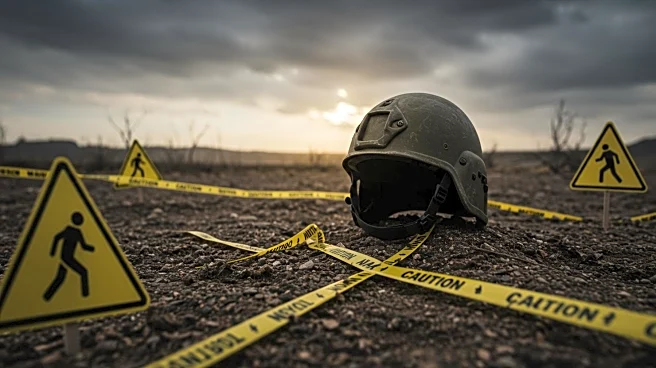What's Happening?
Thailand's army has issued a warning that it may resort to self-defense actions following a landmine incident that injured a Thai soldier near the Cambodian border. The incident occurred when a sergeant stepped on an anti-personnel landmine, allegedly planted by Cambodian forces, resulting in severe injuries. This marks the fourth such incident in a month and the second since a ceasefire was established on July 29, aimed at ending armed clashes over disputed territory. The clashes have resulted in numerous casualties and displacement of civilians. The Thai army claims these incidents violate the ceasefire agreement and international humanitarian law, specifically the Ottawa Convention, which both countries are signatories to. Cambodia has denied these allegations, asserting its compliance with international law and its commitment to not using landmines.
Why It's Important?
The ongoing border tensions between Thailand and Cambodia have significant implications for regional stability and international relations. The repeated incidents of landmine explosions threaten to undermine the ceasefire and could escalate into further military conflict, affecting civilian safety and regional peace. Both countries are parties to the Ottawa Convention, which prohibits the use of anti-personnel landmines, making these allegations particularly serious. The situation also impacts diplomatic relations, as accusations and denials continue to strain interactions between the two nations. The potential for military escalation could have broader consequences for Southeast Asia, affecting trade, security, and international diplomatic efforts in the region.
What's Next?
Thailand has indicated that it may need to exercise self-defense under international law if the incidents continue, which could lead to increased military activity along the border. This escalation could prompt international intervention or mediation efforts to prevent further conflict. Both countries may face pressure from international bodies to adhere strictly to the Ottawa Convention and resolve disputes through diplomatic channels. The situation requires careful monitoring as further incidents could destabilize the region and impact international relations.
Beyond the Headlines
The use of landmines and the resulting injuries highlight ongoing challenges in enforcing international humanitarian laws and agreements like the Ottawa Convention. The situation underscores the need for effective mine-clearing operations and international support to prevent civilian casualties and promote peace. Additionally, the border dispute reflects historical tensions and territorial claims that continue to affect bilateral relations, necessitating long-term diplomatic solutions.








